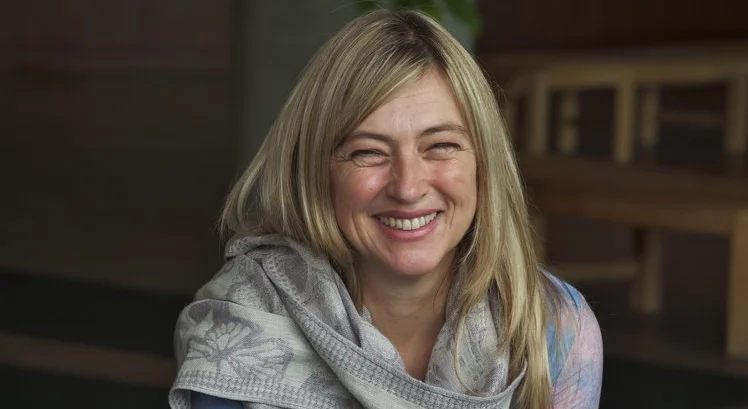At certain points in life we ask ourselves: Why am I here? Why do I have to face this challenge? Am I the right person for this job, to lead the team, to change things? Which way to go?
Story-Telling and Story-Listening can provide a meaningful conversation and reflection on our values and choices in life.Re-authoring our own story enables us to see things differenty, to change our behaviour and become better leaders.
The workshop introduces the Story-Canvas; a framework to work on your own story (or the one of a client) which is easy to learn and provides access to deeper questions and meaningful conversations about biographies and career-paths. The Story-Canvas can easily be applied to agile methods and New Work culture. The Canvas also works as part of a leadership-training.
After a quick introduction on the basics of Story-Telling and Story-Listening, participants will work in pairs of two with the Story-Canvas. Stories are shared with the group at the end of the workshop.
Griet Bouwen
Marianne Schapmans
Re-authoring the future of Tourism / Travel
Participants will hear the story of a future in tourism/travel that is being re-authored as we speak. The story is currently unfolding in the governmental Tourism Flanders Office and its Holiday Participation Centre.
You will discover how Appreciative Inquiry, Generative Journalism, the Re-authoring lens and practices and Sensemaker all came together to facilitate ways of seeing and being that re-ignited the dignity of all that participates. You will taste some of these practices through moments that will be created in the workshop.
Lastly, you will also be introduced and invited to the Connect Your Story project and an exciting StoryWeaver training that all paly in this forest of possibilities.
Workshop Hosts
Christian Riedel
Sherlock Holmes and the Things of Tomorrow
Sherlock Holmes and the things of tomorrow: A collaborative storytelling game to reflect on emergent technologies and future scenarios. Imagine a murder in the year 2100. And you are the police detective who is called to solve it.
Together with your team you inspect the crime-scene. You gather clues and reconstruct what has happened in this world full of new technologies. This is the setup for a collaborative storytelling game that offers a intuitive, playful and fun way to reflect on future technologies and how we think they might influence us.
Instead of a rational approach to create and discuss future scenarios the game allows every player to immerse himself into the future. Each player gets a better understanding of how he and his team see the future. And this shared understanding helps them to rewrite the future of their organisation, business or brand.
I use the game as an entertaining element in creative and innovation workshops. It is a light adaptation of „Sherlock Holmes and the Internet of Things“ developed by the Digital Storytelling Lab at Columbia University. It takes about 90-120 minutes depending on the size of the group playing it. It is best played with 10-15 players.
Joanna Sell
Intercultural Trainer & Coach
Hakuna Mañana - How to create the in-between times and design future?
Paulo Coelho, while describing three symptoms of killing our dreams mentions… lack of time. He says provokingly in his blog “The busiest people I have known in my life always have time enough to do everything.“
And I would love to invite all the busy and less busy persons to join an interactive narrative workshop focusing on the question „How to create the in-between times and design future?“
Further questions to explore are: "How long does last your one minute?", "What can you do to introduce more rubato in your life?", "How are you going to spend myday in the future?", and some more. The workshop is designed beyond storytelling. It is based on story sharing and collective harvesting as well as inspirations regarding intercultural time aspects by Phillip Zimbardo, Edward Hall, Robert Levine and… Alice in Wonderland.
Wilhelm Singer
The sun is still in my eyes. Reflecting on the constructiveness of life.
This workshop is based on a movie project with the Berlin Artist Wilhelm Singer. It will consist of three parts: 1) a short talk between me and the artist (preferably in a dark room, with some some light spots in it. 2) the screening of the movie (which is about 18 min long) and 3) a moderated discussion about the movies approach on how we construct identity, about the singular, the truth and death on one side and the lifes opportunity of florishing plurals. About our re-auhtoring the past and what it makes with our future possibilities.
Workshop Hosts
Rainer Klose
SHAPING THE FUTURE STORY – A LIVE SESSION
Individuals as well as organisations have a desire to feel in control of future und therefore develop ideas of this future, “imagined futures”, that they want to achieve. To reach those goals, they long for having an orientation, where to go next, what goals to focus on, and what steps to be done next.
But looking closer into organisations, the planning of future isn’t beginning in the here and now; it isn’t really beginning with the first action to do to reach the desired future. It rather simply draws the picture of the imagined future in itself - which is a classical vision and mission statement of an organisation – and often fails to inform the members of the organisation about the planned steps to be done to make this imagined future real. But even when organisations inform their staff about the planned steps: they rarely invite them into a shaping process of the paths to go into this imagined future - and so the members of the organisation oppose and react with unwillingness to follow the “subscribed change”. To avoid this reaction, not only the imagined future itself, but also the steps to be done to reach this imagined future should become transparent and ideally “in ownership” of many.
In the workshop the participants get to know the imagined future of the HRD-department of TELEKOM: Dr. Rainer Klose, member of the HRD-department, will give them information about a desired change in this department – the imagined future in a special case and context. After knowing about the desired change, the participants have the task to go 2 different paths into this imagined future:
- the “heroes journey” helps to shape a future story that begins in the here and now and guides through the various steps to be taken to make the imagined future real.
- The 2nd approach begins with a metaphor for the organization in the presence: what image describes the organization the best in the status quo? The 2nd step is to change this image into a metaphor, that makes the imagined future thinkable and desirable.
The participants will shape the future stories with these 2 approaches.
We will discuss the differences, challenges, risks and chances of both approaches for shaping future stories. Dr. Klose can give feedback to the adaptability of the proposals from the group out of the corporate perspective.
Workshop Host
Yannis Angelis
Meike Ziegler
Let’s make “Lov-e & Car-e-osity” a blended model for organizational learning
In a technology-driven world, it has become evident that organizational learning couldn’t have stayed unaffected both by the hype and the need. In this workshop you will be introduced to an e-learning engagement model where the different stakeholders interact with each other both in a physical and digital way sharing their stories and creating new ones for a digital journey. This workshop is for anyone who wants/likes to learn how to use a storytelling-based, participatory approach in any digital initiative they work on.
Jawad Elbied
Arno Aschauer
Director, Lecturer, Coach
Simon Weber
Change Consultant
Ute Clement
Change Management International
Petra Sammer
Partner | Chief Creative Officer
























